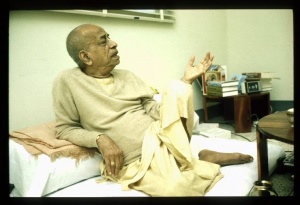SB 3.1.41: Difference between revisions
m (1 revision(s)) |
(Vanibot #0018 edit: make synonym terms in Sanskrit italic in SB - Vanisource) |
||
| Line 1: | Line 1: | ||
{{info | {{info | ||
|speaker=Vidura | |speaker=Vidura | ||
|listener=Uddhava | |listener=Uddhava | ||
}} | }} | ||
[[Category:Srimad-Bhagavatam - Canto 03 Chapter 01]] | |||
[[Category:Bhagavatam Verses Spoken by Vidura - Vanisource|030141]] | |||
<div style="float:left">'''[[Srimad-Bhagavatam]] - [[SB 3|Third Canto]] - [[SB 3.1: Questions by Vidura|Chapter 1: Questions by Vidura]]'''</div> | |||
<div style="float:right">[[File:Go-previous.png|link=SB 3.1.40]] '''[[SB 3.1.40]] - [[SB 3.1.42]]''' [[File:Go-next.png|link=SB 3.1.42]]</div> | |||
{{RandomImage}} | |||
==== TEXT 41 ==== | ==== TEXT 41 ==== | ||
<div | <div class="verse"> | ||
saumyānuśoce tam adhaḥ-patantaṁ | :saumyānuśoce tam adhaḥ-patantaṁ | ||
bhrātre paretāya vidudruhe yaḥ | :bhrātre paretāya vidudruhe yaḥ | ||
niryāpito yena suhṛt sva-puryā | :niryāpito yena suhṛt sva-puryā | ||
ahaṁ sva-putrān samanuvratena | :ahaṁ sva-putrān samanuvratena | ||
</div> | </div> | ||
| Line 16: | Line 22: | ||
==== SYNONYMS ==== | ==== SYNONYMS ==== | ||
<div | <div class="synonyms"> | ||
''saumya''—O gentle one; ''anuśoce''—I lament; ''tam''—him; ''adhaḥ-patantam''—gliding down; ''bhrātre''—on his brother's; ''paretāya''—death; ''vidudruhe''—revolted against; ''yaḥ''—one who; ''niryāpitaḥ''—driven out; ''yena''—by whom; ''suhṛt''—well-wisher; ''sva-puryāḥ''—from his own house; ''aham''—myself; ''sva-putrān''—with his own sons; ''samanu-vratena''—accepting the same line of action. | |||
</div> | </div> | ||
| Line 23: | Line 29: | ||
==== TRANSLATION ==== | ==== TRANSLATION ==== | ||
<div | <div class="translation"> | ||
O gentle one, I simply lament for he [Dhṛtarāṣṭra] who rebelled against his brother after death. By him I was driven out of my own house, although I am his sincere well-wisher, because he accepted the line of action adopted by his own sons. | O gentle one, I simply lament for he [Dhṛtarāṣṭra] who rebelled against his brother after death. By him I was driven out of my own house, although I am his sincere well-wisher, because he accepted the line of action adopted by his own sons. | ||
</div> | </div> | ||
| Line 30: | Line 36: | ||
==== PURPORT ==== | ==== PURPORT ==== | ||
<div | <div class="purport"> | ||
Vidura did not ask about the welfare of his elder brother because there was no chance of his well-being, only news of his gliding down to hell. Vidura was a sincere well-wisher for Dhṛtarāṣṭra, and he had a thought about him in the corner of his heart. He lamented that Dhṛtarāṣṭra could rebel against the sons of his dead brother Pāṇḍu and that he could drive him (Vidura) out of his own house on the dictation of his crooked sons. In spite of these actions, Vidura never became an enemy of Dhṛtarāṣṭra but continued to be his well-wisher, and at the last stage of Dhṛtarāṣṭra's life, it was Vidura only who proved to be his real friend. Such is the behavior of a Vaiṣṇava like Vidura: he desires all good, even for his enemies. | Vidura did not ask about the welfare of his elder brother because there was no chance of his well-being, only news of his gliding down to hell. Vidura was a sincere well-wisher for Dhṛtarāṣṭra, and he had a thought about him in the corner of his heart. He lamented that Dhṛtarāṣṭra could rebel against the sons of his dead brother Pāṇḍu and that he could drive him (Vidura) out of his own house on the dictation of his crooked sons. In spite of these actions, Vidura never became an enemy of Dhṛtarāṣṭra but continued to be his well-wisher, and at the last stage of Dhṛtarāṣṭra's life, it was Vidura only who proved to be his real friend. Such is the behavior of a Vaiṣṇava like Vidura: he desires all good, even for his enemies. | ||
</div> | </div> | ||
__NOTOC__ | |||
<div style="float:right; clear:both;">[[File:Go-previous.png|link=SB 3.1.40]] '''[[SB 3.1.40]] - [[SB 3.1.42]]''' [[File:Go-next.png|link=SB 3.1.42]]</div> | |||
__NOTOC__ | |||
__NOEDITSECTION__ | |||
Revision as of 16:43, 30 November 2017

A.C. Bhaktivedanta Swami Prabhupada
TEXT 41
- saumyānuśoce tam adhaḥ-patantaṁ
- bhrātre paretāya vidudruhe yaḥ
- niryāpito yena suhṛt sva-puryā
- ahaṁ sva-putrān samanuvratena
SYNONYMS
saumya—O gentle one; anuśoce—I lament; tam—him; adhaḥ-patantam—gliding down; bhrātre—on his brother's; paretāya—death; vidudruhe—revolted against; yaḥ—one who; niryāpitaḥ—driven out; yena—by whom; suhṛt—well-wisher; sva-puryāḥ—from his own house; aham—myself; sva-putrān—with his own sons; samanu-vratena—accepting the same line of action.
TRANSLATION
O gentle one, I simply lament for he [Dhṛtarāṣṭra] who rebelled against his brother after death. By him I was driven out of my own house, although I am his sincere well-wisher, because he accepted the line of action adopted by his own sons.
PURPORT
Vidura did not ask about the welfare of his elder brother because there was no chance of his well-being, only news of his gliding down to hell. Vidura was a sincere well-wisher for Dhṛtarāṣṭra, and he had a thought about him in the corner of his heart. He lamented that Dhṛtarāṣṭra could rebel against the sons of his dead brother Pāṇḍu and that he could drive him (Vidura) out of his own house on the dictation of his crooked sons. In spite of these actions, Vidura never became an enemy of Dhṛtarāṣṭra but continued to be his well-wisher, and at the last stage of Dhṛtarāṣṭra's life, it was Vidura only who proved to be his real friend. Such is the behavior of a Vaiṣṇava like Vidura: he desires all good, even for his enemies.